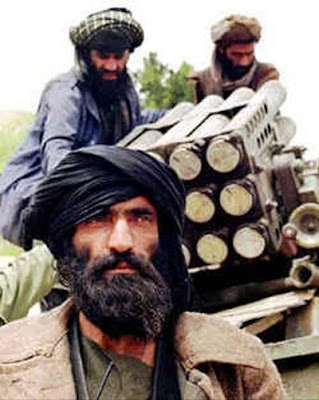
I really encourage you to read all of the six experts' views on whether or not negotiation with the Taliban is a real option - these experts also share what should be the angles, if any, in those negotiations. Now, most of you know that I oppose ANY negotiations with the Taliban but I do favor outreach to the tribal leaders across the country - not exactly the same idea as the Awakenings in Iraq but a bridging concept to enlist the support of tribal leaders in at least holding the line against the Taliban. I've highlighted the two expert opinions on this topic that I think are most spot on, this is from the article at the Council on Foreign Relations:
But bottom line is this: a weak negotiation stance on our part will hang the locals out to dry and we would NEVER recoup that trust, ever again.
Robert Templer, Director, Asia Program, International Crisis GroupAnd here's a second opinion - I've edited this one for length but please read all of his commentary at the full article linked above:
Not yet. Negotiations from a position of weakness will end up boosting the Taliban and further weakening the Afghan state. First, Afghan government institutions need to be strengthened, particularly the police, courts, and prisons. Local government structures need more powers and more money. Then Afghans needs to discuss some basic principles for negotiations. Should the Taliban have to accept the constitution? Are there people in the Taliban who are beyond the pale? Would there be an amnesty? Would they be allowed to keep their arms? And if so, what would the response be from other ethnic groups who bore the brunt of Taliban violence before 2001?
So far hardly any of the key questions have even been asked, never mind answered. Negotiating without some consensus on what these talks would mean is a recipe for even more divisions within the country. Talks that are driven by an outside power such as the United States will not result in enduring agreements. If there are discussions with the Taliban, they need to be driven by Afghans with the basic principles agreed ahead of time. They also need to take place in an environment where a stronger state can absorb insurgents, not be taken over by them. The lessons are clear from earlier agreements with insurgents in Pakistan and Afghanistan. They have mostly resulted in concessions of territory and power to people who have no intention of following the rule of law.
Masood Aziz, Former Afghan DiplomatAs you can see, both of these experts are against the kind of ridiculous "give them what they want" type of negotiations that the Pakistanis have done on the other side of the border with their Taliban. I think what all of the experts are trying to keep in mind is that there has to be some societal outreach in Afghanistan to turn not only any moderate elements of the Taliban but to convince the general population what is in their best interest.
When it comes to the Taliban, we first need to understand who the Taliban are before we start demarches for negotiations. I would distinguish between the al-Qaeda variety of the Taliban and everything else, calling it the "Qaliban." This leading faction represents an actual morphing of key Taliban forces with al-Qaeda, making it virtually impossible to distinguish between them. There is no negotiating with this group. The rest of the "bad apples" are composed of drug traffickers, warlords, and criminals. This last group along with the Qaliban and al-Qaeda itself constitute an influential but small number of individuals which will never support the true interests of the people of Afghanistan and Pakistan and need to be eradicated.
The so-called moderates are the rest of the people, bargaining for their own daily survival, suffering under the oppression of extremists, from insecurity and abject poverty and caught in the war in Afghanistan or subject to neglect and repressive coercion in Pakistan. This is the population we need to protect and support. We need little negotiation here.
Let us not believe in the naïve notion that negotiation with the Taliban means handing Mullah Omar a position in the Afghan Cabinet or that money will buy loyalty from the Taliban. Instead, it should mean doing everything possible to endow the local authorities to have the ability to reach into the villages, allowing each district and locality to have enough security so that they can form local jirgas, determine their own needs, and seek partnerships with the authorities
But bottom line is this: a weak negotiation stance on our part will hang the locals out to dry and we would NEVER recoup that trust, ever again.
No comments:
Post a Comment